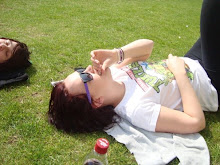Choose an example of one aspect of contemporary culture that is, in your opinion, panoptic. Write an explanation of this, in approximately 100-200 words, employing key Foucauldian language, such as 'Docile Bodies' or 'self-regulation, and using not less than 5 quotes from the text 'Panopticism' in Thomas, J. (2000) 'Reading Images', NY, Palgrave McMillan.
One panoptic aspect of society that is ever present is religion. The religion itself may vary but fundamentally they are all based on the belief that a god, or higher being, is an omniscient presence in society. This concept alone is a prime example of ‘conscious and permanent visibility that ensures the functioning of power’ (Foucault in Thomas, J. 2000: 82) – the Church never has to physically discipline its followers because God will eventually determine a person’s worth; society self-regulates on the promise of Heaven in the after life.
The importance of God is strengthened through mass and celebrations within which society is subconsciously led to accept a power that is both ‘visible and unverifiable’ (Foucault in Thomas, J. 2000: 82). We are constantly exposed to religious artefacts, paintings, teachings but we can never totally prove or understand if this power is being exercised. The power is ‘non-corporal’ (Foucault in Thomas, J. 2000: 83) and the threat of surveillance ensures that we, as docile bodies, adhere to an accepted behaviour. ‘A real subjection is born mechanically from a fictitious relation’ (Foucault in Thomas, J. 2000: 83), within society we have imagined a power dynamic that we willingly subject ourselves to. We are not forced into religion. We are raised to understand that it is natural; a myth of the modern day. The idea that ‘visibility is a trap’ (Foucault in Thomas, J. 2000: 80) is essential to understanding the power mechanism in place – nothing is hidden, every move you make is recorded and registered in the eyes of The Church.
Religion may be one of the ultimate panoptic tools within society as it embodies two key political dreams: ‘the first is that of a pure community’, the idealistic community of Heaven and also a very real society free from deviants and non-conformists; and ‘the second is that of a disciplined society’ (Foucault in Thomas, J. 2000: 79), we are ordered, docile, regulated and most importantly, correctly trained.


No comments:
Post a Comment